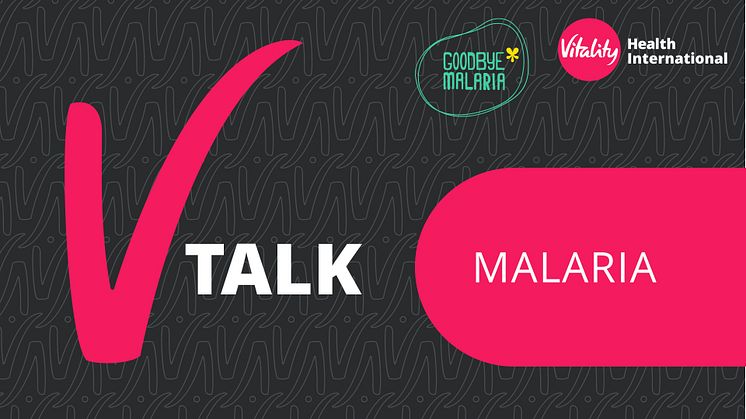
Press release -
Vitality Health International’s inaugural V-Talk session ignites critical conversations about malaria: a preventable and treatable disease
Vitality Health International launched its inaugural V-Talk panel discussion last week with the aim of addressing critical health, wellness and economic challenges facing the African continent.
In the V-Talk series, leading experts are invited to identify and implement innovative healthcare solutions that protect, enhance and save lives across the African continent.
The inaugural V-Talk focused on malaria and panelists included Mike Mpanya (Business Innovation Specialist at Vitality Health International), Sherwin Charles (Co-founder and CEO of Goodbye Malaria), Robbie Brozin (Co-founder of Nando’s and Goodbye Malaria), Dr Ron Whelan (Deputy CEO of Discovery Health), Dr Noluthando Nematswerani (Chief Clinical Officer at Discovery Health), and the CEO of Vitality Health International Africa, Emma Knox. Special guests included highly respected infectious diseases specialist, Professor Lucille Blumberg, as well as Dr Brian Brink, retired chief medical officer at Anglo American and treasurer on the Section27 board. Dr Brink also serves on the board of directors of the Global Fund to Fight AIDS, Tuberculosis and Malaria.
In acknowledgment of the SADC (Southern African Development Community) Malaria Week (6 to 10 November) and SADC Malaria Day (6 November), the first V-Talk panel discussion – themed ‘African solutions to African problems’ – delved into the state of malaria in Africa and how working together in partnership, the senseless loss of lives to a disease that is totally preventable and treatable can be achieved.
CEO of Vitality Health International: Africa, Emma Knox, opened the discussions by pointing out that malaria continues to be the leading cause of mortality across many countries in Africa. Despite significant changes and enhancements in prevention and treatment, the progress is still fragile.
“Malaria is a fully preventable and treatable disease, and it has been eliminated in several countries across the world; but sadly, in Africa, it continues to take lives. One child dies of the disease every minute,” she said.
Just over 50% of malaria deaths worldwide take place in four African countries
According to the World Health Organization (WHO), four African countries accounted for just over half of all malaria deaths worldwide:
- Nigeria (31.3%)
- The Democratic Republic of the Congo (12.6%)
- The United Republic of Tanzania (4.1%)
- Niger (3.9%)
Africa continues to carry a disproportionately high share of the global malaria burden. Statistics released in the 2022 WHO World Malaria Report revealed that Africa had 95% (234 million) of malaria cases and 96% (593,000) of malaria deaths. Eighty percent (80%) of these annual deaths are sadly those of children under the age of five.
A powerful partnership breathes new life into the drive to eliminate malaria
Vitality Health International, an innovative health insurer that rewards healthy living for employees in Africa (and owned by Discovery Group), has partnered with social benefit organisation, Goodbye Malaria, with a common cause and goal. This partnership shares a strategic focus in the fight against malaria in Africa, with the aim of striving to eliminate this deadly, yet preventable, disease in years to come.
Mpanya explained how the partnership evolved: “During the planning phase of expanding our shared-value model into the rest of Africa, we were faced with a question of how we contextualise our shared-value health insurance approach. Based on findings from credible research sources, we can confirm that that malaria was the biggest health issue facing Africa. There are about 250 million cases of malaria in Africa every year.”
Mpanya explained that expanding into Africa was not just about business anymore, it was now about saving lives.
Mpanya continued: “For a traditional insurer that could be a contradiction but for Discovery, with a core purpose of making people healthier and enhancing and protecting lives, it made a lot of sense. Our focus shifted from how we create commercial value to how we can make a meaningful difference. That’s when we reached out to Goodbye Malaria who continues to contribute effortlessly towards fighting against malaria and who also aligned well with Vitality Health International’s core purpose.”
Discovery Vitality MoveToGive has partnered with Goodbye Malaria to help eliminate the deadly infectious disease across Southern Africa. This initiative enables Discovery Vitality members to donate their Discovery Miles towards a range of interventions in support of ending malaria. Dr Ron Whelan explained, “Members who engage in healthy lifestyle activities like meeting their exercise goals on a weekly basis, driving responsibly and spending appropriately, get to unlock Vitality Active Rewards and Discovery Miles. The Discovery Miles earned can then be used to buy a range of products on the Vitality Mall or they can be donated to good causes through Vitality MoveToGive. In this case, MoveToGive provides the option for members to donate Discovery Miles to a range of malaria eradication initiatives led by Goodbye Malaria. For a small amount members can therefore support Goodbye Malaria in funding the costs of spraying of houses, providing malaria rapid test kits and medicine for the treatment of malaria.”
Goodbye Malaria is an African-run initiative with the ultimate goal of eliminating malaria. Founded by concerned African entrepreneurs including Robbie Brozin (who also founded the international food chain Nando’s), Goodbye Malaria believes our generation can create innovative solutions that change the way the world sees Africa. Brozin explains, “Goodbye Malaria facilitates public-private partnerships, bringing together the private sector, the governments of Mozambique, Eswatini and South Africa as well as The Global Fund while supporting and catalysing on-the-ground malaria elimination programmes. In Southern Africa alone, over the last 10 years, Goodbye Malaria together with their private sector partners has committed US$ 13 million (around R247 million) to the fight against malaria in Mozambique, South Africa and Eswatini (known as the MOSASWA region).”
Sherwin Charles adds, “When we started out, we found that the primary challenge extended beyond advocacy, there was a real lack of consistent, sustainable implementation on the ground. This realization prompted a strategic shift in our approach. We discovered that for us to make a real impact we needed boots on the ground. We also needed to bring the private sector mindset to the implementation of public health interventions. Although we have made significant progress in reducing the malaria burden in the three countries, the challenge now is to sustain that success and widen our scope to more countries in Africa.”
A multi-pronged approach to dealing with malaria
From a medical perspective, Dr Noluthando Nematswerani believes that awareness of malaria and malaria prevention is key. Nematswerani said, “Even though we are in a country [South Africa] that has low transmission rates, we do have high transmission zones within South Africa, and we share borders with countries that have a high prevalence. Since Vitality Health International is also operating in countries that have a high prevalence of malaria, we are perfectly positioned to play a part in working towards eliminating the disease.”
Like with most infectious conditions, malaria requires a multipronged approach – indoor spraying, nets and the responsible use of prophylactics when travelling. Nematswerani continued, “It is a timely discussion because the holiday season is approaching. Today you can go to a pharmacy and get your medication without a prescription, removing the barrier of getting a prescription from a doctor. It is also important for travellers to protect themselves in malaria areas by, for example, wearing long covering clothes, staying indoors around dusk and dawn and using insect repellent appropriately.”
The indoor residual spray is highly effective for households
The challenge with insecticide-treated bed nets is that there is only one insecticide that is currently used, and the mosquitoes become resistant to this insecticide after a while. The World Health Organization recommends using nets treated with other types of insecticides in order to overcome this resistance.
“Indoor residual sprays allow for rotation of insecticides making it a great alternative to nets,” said Nematswerani.
Brozin concurred, “Spraying houses is incredibly impactful and, in our experience, one of the most effective solutions. You can control the implementation and therefore you control the impact and the outcome. Furthermore, it only costs R80 to protect a life through indoor residual spraying.”
A new malaria vaccination brings hope for children
Another exciting development is the research that has been done on developing a malaria vaccine for children against the most deadly malaria parasite, Plasmodium Falciparum. Young children have lower immunity levels and as such are highly vulnerable to malaria. The vaccine is currently recommended for children from the ages of 5 months who live in regions with moderate to high malaria transmission. It has already been rolled out in a few African countries and more countries are expected to start rolling it out in 2024.
Sherwin Charles said, “The vaccination is an important addition to our toolbox. We must continue advancing and creating innovative tools that result in greater impact. Our communities report, and research confirms, that despite their efforts, malaria cases are on the rise in certain countries. Part of the messaging and the advocacy that we need to build awareness around, is how effective the vaccine is in preventing child death. The vaccine must, however, be integrated with proper vector control measures.”
Raising the malaria voice
Professor Lucille Blumberg, malaria champion and advocate, is excited about the partnership that has emerged. “We’ve really made great progress in eliminating malaria in four Southern African countries. The last miles are the hardest. It’s all about raising the malaria voice. COVID has led to the dampening of that voice and low awareness in communities. Goodbye Malaria has made a notable difference and hopefully it will continue to do so with Vitality Health International and Discovery Vitality on board. We have the science, energy, passion and innovation to make a real difference.”
Knox concluded the inaugural V-Talk session with optimism for the powerful partnership and shared vision of people who are passionate about eliminating malaria, “How much do we care? A lot! We are extremely proud to be joining this panel of incredible partners who have already been making a difference on the continent for more than a decade. We are excited to join that journey and movement, and align with their core revelation of If not us, then who? If not now, then when?”
Ways to make a life-changing donation to Goodbye Malaria
Discovery Miles
Donate your Discovery Miles to Goodbye Malaria through Vitality MoveToGive in the Discovery app > Vitality > Spend in Vitality Mall > MoveToGive Donations
Vitality Active Rewards
Select Vitality MoveToGive as an instant reward option when you achieve your weekly goals in the Discovery Bank app.
Make a direct donation
Make a one-time or monthly donation: donate.goodbyemalaria.com
ENDS
Topics
Categories
Vitality Health International
A subsidiary of Discovery Limited, a global insurer that pioneered the Vitality programme as a way to help people be healthier, Vitality Health International has launched a ground-breaking insurance product customised for Kenya’s leading businesses. The Vitality Health Insurance offering is unique because it is an insurance product that focuses on wellbeing, aimed at positively impacting people’s health outcomes while improving and protecting their lives. Vitality Health International is owned by multi-award winning South African insurer, Discovery, which pioneered the Vitality Shared-value Insurance model in South Africa, changing the insurance landscape with a health insurance model that rewards people for healthy living, and building successful partnerships globally with leading insurers. Today, Discovery has a global presence, operating in 40 markets, impacting the lives of more than 30 million people worldwide. Since its launch in January 2022, Vitality Health International has been gaining momentum in bringing health insurance that rewards healthy living to employer groups in the rest of Africa. Vitality Health International is currently present in 7 countries. Ghana, Kenya, Mozambique Democratic Republic of Congo, Nigeria, Tanzania and Zambia.



